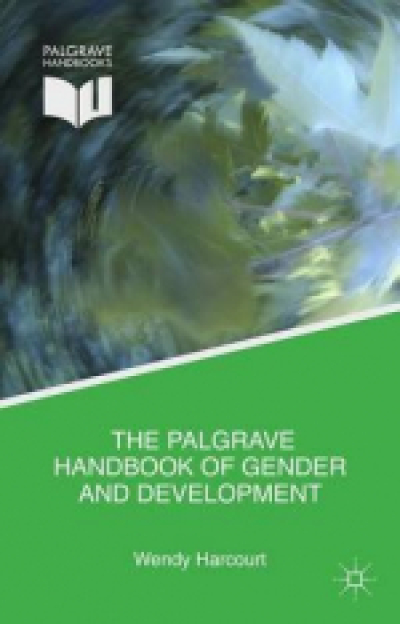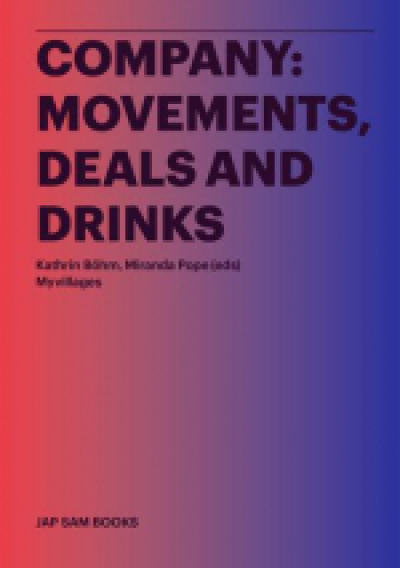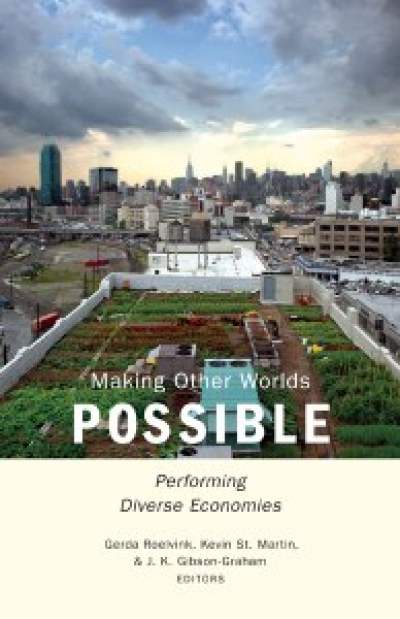Publications
Intrinsically, community development involves navigating dilemmas. These dilemmas have intensified as neoliberal “arts of government” become more widespread and a “results agenda” more entrenched. Recent studies explore how community development practitioners manage the ambiguities of this current context. This article contributes by exploring how practitioners who work with Aboriginal communities in Central and Northern Australia navigate the dilemmas they encounter. Consistent with other studies, we find that practitioners draw on the foundations of community development practice while also responding to the specific characteristics of the setting.
In this article, we argue that paying attention to the diverse assemblages of care enables us to go beyond simplistic natural versus medical models of birth and maternity care. We draw on interviews with women in New Zealand.
This review essay of Miranda Joseph's Debt to Society reflects on its relevance to both Aotearoa New Zealand and community economies thinking.
Part of a special issue 'Activists with(out) organisation' edited by Richard White and Patricia Wood, this article argues that the environmental and caring labour of mothers within the home is a kind of collective economic and environmental activism, where the collective is hybrid human and more than human. I connect the work mothers do in the home with the kinds of shared concerns community economies activists gather around.
The economic empowerment of women is emerging as a core focus of both economic
development and gender equality programs internationally. At the same time there is
increasing importance placed on measuring outcomes and quantifying progress towards
gender and development goals. These trends raise significant questions around how well
gender differences are understood, especially in economies dominated by the informal sector
and characterised by a highly gendered division of labour, as is the case in many Pacific
countries. How well do existing international and national indicators of gender equality
reflect the experiences and aspirations of Pacific women and men? What do concepts such as
No Place for Wilderness: Urban Parks and the Assembling of Neoliberal Urban Environmental Governance
In this paper, I examine the ways in which urban parks are enrolled in political struggles to reorient the techniques of urban governance toward entrepreneurialism as the only viable model for economic development. Through a case study of Philadelphia’s Fairmount Park System, I examine a series of events during the previous three decades in which Fairmount Park has become subject to this reorientation toward entrepreneurialism. Specifically, I examine how parks, no longer treated as spaces of “nature”, have been reframed as self-supporting constituents of a business-minded urbanism, promotional tools for the attraction of new labor to the city, and a reinforcement of the notion of entrepreneurialism as the inevitable urban development strategy for the 21st century.
In this paper we use the concept of surviving well to reframe contemporary discussion of happiness and wellbeing in the context of international development discourse. While the attempts to move beyond metrics that privilege economic growth as the singular indicator of progress, it's equally true that our understanding of happiness and wellbeing needs to move beyond individual notions of contentment and towards a measure that allows people to thinking about their own needs in relation to others and in relation to planetary wellbeing.
Today the planet faces a genuine tragedy of the unmanaged “commons.” For decades an open access and unmanaged resource has been treated with the same sort of disregard as Hardin’s pasture was treated. The planet’s life-supporting atmosphere has been spoiled by “‘help yourself’ or ‘feel free’ attitudes” (Hardin 1998: 683). We are now faced with the seemingly impossible task of transforming an open access and unmanaged planetary resource into a commons which is managed and cared for. With the cause and impacts of global warming now beyond debate, we are being pressed to take responsibility and to act in new ways. But how are we to do this? What type of politics is called for?
In preparing for the talk associated with this paper I was invited to consider two things—the future of the arts in the era of austerity and restructuring and what the arts community might learn from the environmental movement. My thoughts on how to respond to this positioning is directed by my involvement with the Community Economies Collective (CEC) an international group of activist-scholars interested in enacting post-capitalist economies. And it is in this context that the concept of the Big Society provides us with an interesting point of departure.
Childbirth has been transformed by increased use of life-saving medical technologies, greater understanding of the complex interplay between care environments, emotional states, complex biophysical processes and ongoing physical and mental health for babies and mothers. Maternity care has also been subject to broader changes in healthcare economies that reposition mothers as rational consumers in a health care marketplace. Drawing on empirical research we identify problems with imagining maternity care and the cared-for subject via 'choice' alone, and explore how the diverse assemblages that converge in birthing spaces could be better attended to through alternative 'logics of care' (Mol, 2008).
What might an alliance between Gibson-Graham’s concept of community economy and Laclau
and Mouffe’s concept of hegemony generate for theories and practices of everyday postcapitalist
politics? This essay theorizes a shared space between these concepts, opening up new ground for
politics. It provides an illustration of the dynamic of hegemony within a community economy
through empirical work carried out with food-sovereignty collectives in the Asturias region of
northern Spain. These collectives demonstrate economic practices that foreground our
communality and interdependence while negotiating the exclusion that accompanies all
politics. These food sovereignty economies demonstrate that when the concept of hegemony
This article introduces German language readers to the work of J. K. Gibson-Graham. Thematically, it discusses the relevance of gender and class as intertwined categories in the diverse economy perspective.
Building Dignified Worlds investigates social movements that do not simply protest but actively forge functional alternatives. Gerda Roelvink takes actor network and performativity theories of action as starting points for thinking about how contemporary collectives bring the new into being.
![[cover image]](/sites/default/files/styles/medium/public/2017-11/image_web1.jpeg?itok=HQaEQKT1)
As a graduate student I first came into contact with the work and persons of JK Gibson-Graham. As I was mentored and supervised by Katherine Gibson, the piece, Building Community Economies: Women and the Politics of Place became part of my journey into feminism and feminist postdevelopment research. In this chapter, I highlight three principles I have carried with me from that time until now: starting where you are, seeing diversity, and multiplying possibility. With reference to my own developing research interests, I show how Gibson-Graham's work is relevant and inspiring in a third wave feminist context.

This paper explores the territoriality and politics of birth. Engaging with debates that are largely polarised between discourses of natural versus medical birth, in this paper I take an in depth look at one birth story, and look for a different way to think through how women's birth experiences might be understood. Written at the beginning of a year of research into women's birth experiences this paper represents my early thinking in the study.
Book outlining the ideas and ambitions behind Company Drinks.

This chapter focuses on urban-based enterprises that are building direct links with rural producers and taking seriously the idea that urban consumers have a role to play in stewarding our agricultural environments and securing livelihoods for farmers. When these sorts of concerns are placed at the heart of the enterprise we find that economic innovations follow, and that along with producing benefits for farmers these innovations are also impacting employees and consumers. This results in businesses that are very different from the mainstream model of enterprise--the capitalist firm in which profit-maximization is at the heart.
This chapter reflects on the role that an experimental social research approach might play in coming to terms with a future in which the certainties of the past have gone and the future lies before us unknown. This experimental approach means setting aside the idea of research as a neutral and objective activity in which there is critical distance between the researcher and the object of study. Instead, research would entail making a stand for certain worlds and for certain ways of living on the planet, and taking responsibility for helping to make these worlds more likely and these ways of living more widespread.
In this chapter, Jenny Cameron and Robert Pekin (from Food Connect, an innovative Community Supported Agriculture initiative operating in South East Queensland, Australia) reflect on the diverse economic practices that can be used to support sustainable and ethical food economies.
From marching for change to producing the change: reconstructions of the Italian anti-mafia movement
The article discusses the shifts in Italian anti-mafia activism from its origins in the nineteenth century to today. The claims, the modes of action and the actors involved have in factvariedconcurrently with the metamorphosis of the mafia, the Italian state and society. Previous waves of anti-mafia protestwere prevalently class-based and often followed the massacre of heroes who stood up to corruption. On the other hand today’s panorama is characterised by a growing number of civil society organisations thatare producing commercial products which contrast the mafia economy through thecreation of an alternative market. The analyses draw on existing literature and on myown qualitative data collected from May-September 2014.
The commons is increasingly invoked as a way to envision new worlds. One strand of commons research focuses at the local scale, on small groups in “traditional”, mostly rural societies; this research asks how commons are maintained over time. Another strand focuses on the commons at a global scale; this is political research that asks how commons can be reclaimed from a capitalist landscape. Here, I bridge these two approaches by theorizing the commons as reclaimed and maintained in the context of the city, through examining the experiences of limited-equity housing cooperatives in Washington, DC.
In this book chapter, we consider what it would mean to see the sites and practices of 'life's work' as potential areas that spark change in economies and subjectivities.
This essay responds to the generous commentaries on the talks Jodi Dean and I delivered during the 2013 Rethinking Marxism International Conference. It offers further reflections on communism as a political project, on its relation to postcapitalist practices, and on Dean’s desire to “return to the party,” making two distinct interventions. First, while I remain agnostic about the relevance of the party, I express concerns about Dean’s sharp delineation between what is political and what is merely lifestyle choice, postcapitalism being encompassed in the latter.
What exactly constitutes an economy? Making Other Worlds Possible brings together a compelling range of projects inspired by the diverse economies research agenda pioneered by J. K. Gibson-Graham. Firmly establishing diverse economies as a field of research, Making Other Worlds Possible outlines an array of different ways scholars are enacting economies that privilege ethical negotiation and a politics of possibility.
What makes the book so special is that each of authors know the communities they speak of and they write with real passion — Antipode

On January 29th, 2014, a community conference called Groundswell brought community members together in order to inspire creativity, ideas, and relationships that advance the wellbeing of our community. This report illuminates both the process of facilitating meaningful community engagement as well the outcomes of doing so. The report was written for the community in which the event took place, but the hope is that it also inspire similar efforts in other communities that are ready for a groundswell of their own.
Introduction to a PhD thesis project about collective ethical economic action for a climate and resource changing world. It includes diverse economy food stories from the Philippines and from my home in the NSW Southern Tablelands of Australia, as well as a thesis outline.
'Growing Community Food Economies in the Philippines' is a PhD thesis about collective ethical economic action. It draws on empirical cases of regional food projects in Manila and Mindanao and examines possible post-capitalist economic growth trajectories in the Philippines context. This project also examines collective methods. Drawing on actor network theory and hybrid collective thinking it empirically demonstrates 'hybrid collective world making', foregrounding the role various human and nonhuman actors (e.g. typhoons, river systems and digital media) play in shaping food and economic futures.
Excerpt 1 is a thesis chapter about community economies thinking and practice and growing community food economies in the Philippines through hybrid collective methods.
This book chapter challenges the conventional separations between "economy" and "ecology," proposing instead a perspective of "ecological livelihoods" in which sustenance is understood as an always-collective process of ethical negotiation involving humans and myriad living others. Drawing on and modifying Gibson-Graham's previous work on "ethical coordinates," we suggest some glimmers of what an ethical economics in an acknowledged more-than-human world might look like.
This commentary responds to papers by Jodi Dean and Stephen Healy in a special issue of Rethinking Marxism, proposing that one does not need to choose between being an anti-capitalist revolutionary attentive to the material power of capitalist colonization, or being a post-capitalist ethical subject, eschewing critique, and entirely disavowing capitalism and its forms of violence. Community economies theory can be significantly strengthened through increased engagement with two key domains of praxis that it has tended to avoid: militant cross-sector organizing and a non-totalizing critique of capital.
